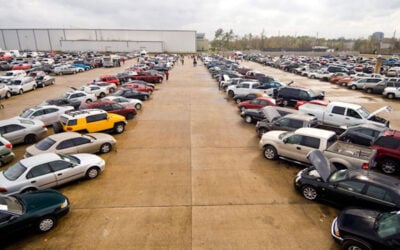In the early hours of March 26, 2024, the Francis Scott Key Bridge in Baltimore met a catastrophic fate as the Dali, a vessel with a capacity of 10,000 containers, collided with one of its pillars. This incident led to the immediate closure of the Port of Baltimore, a critical node in global logistics and trade. According to Maryland Governor Wes Moore, over 52 million tons of foreign cargo valued at around $80 billion were managed through this port last year, marking it as the 11th largest port in the United States.
Much of the Port’s trade involves the automotive industry, both domestic and international. This has car buyers wary of the tragic event’s possible impacts on car prices, just as new car prices are finally dropping.
Will the Baltimore bridge collapse impact car prices? If so, will the impact be immediate and broad, or more nuanced in nature? Let’s take a look at the knowns and unknowns as the situation stands today.
The Impacts on the Automotive Industry

The Port of Baltimore is not just any port; it stands as the premier gateway for the import and export of automobiles and light trucks in the United States. In 2023, the port processed 847,158 cars and light trucks. Major automakers like Nissan, Toyota, General Motors, and Volkswagen as well as luxury brands such as Audi. Jaguar Land Rover, and Lamborghini heavily rely on this port for their operations.
Auto imports from Germany, Mexico, Japan and the United Kingdom heavily use the Port of Baltimore, but will have to find immediate alternatives.
The collapse of the Baltimore Bridge casts a shadow of uncertainty over the automotive industry. The immediate impact will be felt in exports, particularly for American manufacturers like General Motors. However, imports will surely be impacted as well. With $23 billion of the port’s imports in 2023 being autos and light trucks, the disruption is bound to send ripples through the market.
The effects won’t be confined to Baltimore alone. The East Coast boasts eight major ports, with Baltimore ranking fourth in size. Ports like New York, Norfolk, and Savannah are already gearing up to absorb the diverted cargo. The shift could temporarily relieve some pressure, but the long-term ramifications remain uncertain, especially for European automakers who depend heavily on Baltimore’s roll-on/roll-off vehicle facilities.
Will the Baltimore Bridge Collapse Raise Car Prices?
Just as new car prices are finally beginning to fall, this disaster has the ability to reverse course for at least some of the auto market. To grasp where the new car market stands today, take a look at price trends over the past four months:

Despite the logistical nightmares, the current oversupply of new cars in the market might cushion the immediate economic impacts. New car prices have been falling for months. With a 90-day supply of new cars in the U.S., exceeding the usual 60 days, the overall automotive industry has a buffer against short-term disruptions. Some new cars now take over one year to sell on average.
See the Fastest and Slowest Selling Cars This Month
That’s not to say that relatively minor impacts are already being felt. Car Dealership Guy on X shared the first direct impacts known, with Jaguar Land Rover’s shipment of 800 vehicles being forced to detour.
The Clock Starts Now
Ultimately, impacts will be determined by how long it takes to rebuild. The original bridge took 5 years to construct. The US Coast Guard has said it may take ‘years’ to rebuild. If the Port of Baltimore is reopened sooner, impacts on the industry could be minimized. But if we’re talking 5 years without a fully operational port, new car prices could see a more pronounced impact.
We’ll update this page with the latest news on rebuilding and reopening as it becomes available.
Will Gas Prices Rise?
The bridge collapse could also tighten the screws on the region’s gasoline supply, particularly ethanol. With the Baltimore area relying on a blend of gasoline and ethanol delivered by train and barge, alternate routes must be found swiftly before East Coast gas prices tick upwards. Some industry analysts already predicted oil prices to approach $100/barrel before the bridge disaster.
You can always stay on top of regional gas price trends with AAA’s Gas Price Tracker.
Things Could Change
Following the Baltimore bridge collapse on March 26, repercussions on the automotive industry are still unfolding. As logistical networks strain under the sudden disruption, the resilience of the global trade and supply chain faces a significant test. For now, it appears that the following car brands are most likely to be affected in the near-term, according to Car Dealership Guy:
- Nissan
- Toyota
- General Motors
- Volvo Car
- Jaguar Land Rover
- Volkswagen including Audi, Lamborghini and Bentley
While supply chain constraints may be more immediate for these brands, the effects will be primarily on exports for OEMs like General Motors. Stay tuned to this page for the latest car market updates as more information becomes available.








![10 Cars with the Lowest Cost of Ownership [2026 Data]](https://caredge.com/wp-content/uploads/2026/02/2026-Toyota-Corolla-Hatchback-400x250.png)




0 Comments